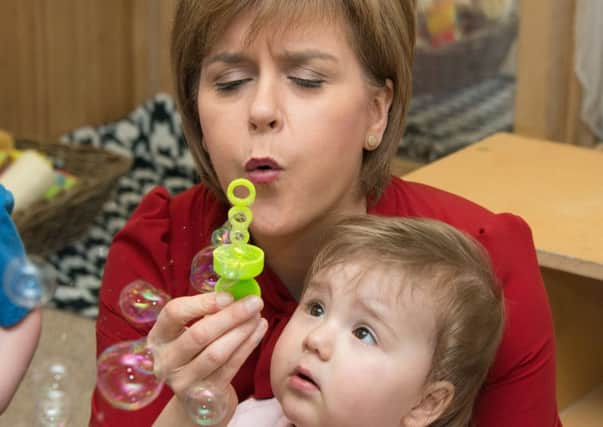Martyn McLaughlin: Will SNP's childcare plans institutionalise kids?


For all that it has been hailed as a transformative and widely popular measure, the Scottish Government’s pledge to nearly double the amount of free early learning and childcare entitlement for all three and four-year-olds and eligible two-year-olds has not had its problems to seek.
Last week, in a scathing assessment of the nation’s readiness for the implementation of 1,140 hours of provision in August 2020, Audit Scotland made clear there were “significant risks” which might prevent local authorities from fulfilling one of the SNP’s flagship policies. It identified a yawning gulf between what councils need and what the Scottish Government intends to offer. The shortfall is significant enough to place the entire scheme in jeopardy, given it spans as many as 6,000 staff, £290m in infrastructure investment, and a further £160m in annual revenue spending.
Advertisement
Hide AdAdvertisement
Hide AdYesterday, meanwhile, the Fair Funding For Our Kids campaign group published research indicating that only one in ten local authority nurseries provides the length of care to cover a full working day. Its findings show that across 19 of Scotland’s 32 council areas, there are no public nurseries at all open between 8am and 6pm. Such restrictions, it says, show how the system is failing working parents.
Both reports make for disconcerting reading. If their considered criticisms bring about extra funding and forges a closer working relationship between central and local government, all the better. But it will not be enough. Or to be more precise, it will continue to overlook a crucially important issue.
With two-and-a-half years to go until the childcare revolution begins, there are already ominous signs that an ambitious and lauded policy may end up having a detrimental influence on those it should be benefiting the most.
It is not within the purview of Audit Scotland or Fair Funding For Our Kids to assess how the increase to 1,140 hours will impact on the well-being and education of pre-schoolers, but their assessment of the initiative’s merits is indicative of the narrow scope of the debate about the purpose of the childcare expansion.
The conversation is focused almost exclusively on how the extra hours might allow parents, in particular mothers, to enter employment, increase their working hours, or embark on further education. Cumulatively, it is hoped such measures will narrow Scotland’s educational attainment gap between rich and poor, and ultimately, close it altogether.
Such aims are undoubtedly critical, although as Audit Scotland points out, it is impossible to determine what, if any, progress has been made since the entitlement rose from 475 hours a year to 600 hours in August 2014. In its wisdom, the Scottish Government did not carry out economic modelling to assess the policy’s economic impact, such as additional tax revenue generated by parents who take up work.
If that particular oversight suggests the Government has been too quick to rush through the childcare expansion, another all but confirms it – despite an outlay of £648m, there is no evidence to show that increasing the amount of time three or four-year-olds spend in nursery is advantageous to them.
As Audit Scotland noted, the impact of the expansion on the outcomes for children is “unclear” because the Government “did not plan how to evaluate this”. With no baseline data or indicators in place, the strategy is predicated on a well-intended hypothesis. But there is a thin line between presumption and negligence. This is not how to govern.
Advertisement
Hide AdAdvertisement
Hide AdQuite how this slipshod state of affairs has been allowed to fester is a question the childcare minister, Maree Todd, must answer. She may have been in her post for only three months, but the 1,140 hours pledge was first made by the SNP in November 2013. How is it that nearly five years on it still does not know how to evaluate one of its key policies?
Despite this, the Government is rushing headlong towards August 2020, with local authorities scrambling in their wake. Many councils are at an early stage of planning, but others have already devised preliminary models of how the increased entitlement will look in practice.
In East Renfrewshire, a local authority whose reputation is based almost exclusively on educational achievement, one option is for ‘extended day provision’, whereby parents can place three or four-year-olds in nursery for three ten hour-long days every week. For those who fear such hours will amount to the institutionalisation of toddlers, there is a paucity of research to set their minds at ease, and given the fact that there are proportionately far fewer private nurseries and childminders in Scotland’s most deprived areas, a system purporting to offer choice may prove unyieldingly rigid.
The near doubling of childcare represents the biggest overhaul of Scottish education since the introduction of Curriculum for Excellence, and it is unique in that, if implemented properly, the scheme could well help lift families out of poverty and reduce inequality. But as things stand, there is no evidence it will do either, and in any case, the SNP cannot blithely commandeer childcare as a vehicle for its wider social justice ambitions, commendable though they may be.
It may be viewed as politically ruinous to slam the brakes on one of its pivotal policies, but putting the expansion on hold temporarily would allow the Scottish Government to reflect on what has until now been an afterthought – the needs of the children must come first.
